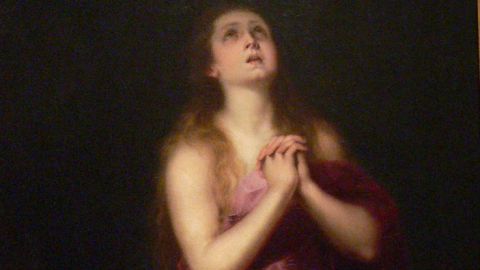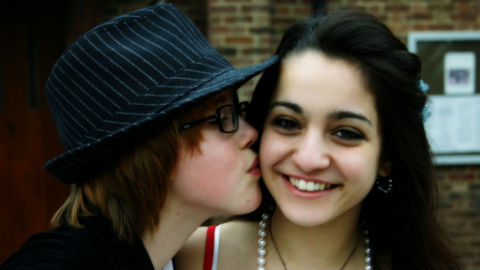Is Religion Bad for Women?

Editorial Note: This is a guest contribution from KristenWolf, author of The Way, which was was recently selected by Oprah for her Reading List.
Everyone grows up under the shadow of religion. No matter your race, gender, creed, or lack thereof, every aspect of our lives is touched, if not deeply affected, by our religious practices.
Why? Because religions reflect our deepest yearnings, our core values, and it is between these two bookends that we think, render decisions, and act in every arena — whether within our families, voting booths, work, social occasions, and so on. But I’m an atheist! I’m agnostic! some of you may say.
No matter. Even if you were raised without formal religion, or have since fallen away, one of your next-door neighbors keeps a faith. So might the person driving your child’s school bus. Your senator. Even the stranger living 8,000 miles away who assembled your cell phone.
Yet while every one of us feels the impact of religion, a shocking disparity exists: half of the population is excluded from the imagery and leadership of the world’s major faiths. Don’t think so?
Here’s a personal story: As a young girl being raised in the Catholic tradition, I had a definite sense of being somehow inferior, tangential. In my world, the church leaders could only be male, our God was male, and the main player was the Father’s only son. The few women I saw filled ancillary roles. There was Mary, a passive and reluctant mother, the nuns in their cloisters, and the women hidden away running the back office.
As a child I remember thinking it strange that the very beings who brought us into life and who innately embodied the ideals that Jesus upheld – forgiveness, compassion, cooperation, nonviolence, inclusion, respect for life — were not being included, nor honored, in the spiritual domain.
As my friend, Kavita Ramdas (former President and CEO of the Global Fund for Women), wrote in her blog: “Considering that women birthed every prophet from Moses to Buddha to Krishna to Jesus to Mohammed — suckled them, nursed them when they were sick, believed in them when everyone else said they were nuts, you’d think we’d get a little more respect.”
In her good-humored way Ramdas makes a critical point. We have only to conduct a survey of today’s major religions to see that the divine beings and worldly actors are disproportionately male. In fact, the numbers are grossly lop-sided when compared to the human population, the natural world, and even the history of divine beings.
How, then, is such an obvious exclusion of women and girls possible? How can the bringers of life and the beings who innately possess the universally cherished ideals of forgiveness, mercy, and cooperation be left out? And how has such a surreal phenomenon gone unchallenged?
How and why women have been excluded from the imagery and leadership of most major religions — and how the disparity has rarely been resisted — requires a discussion far beyond the scope of this article.
However, we can still acknowledge the fact that something is terribly wrong. But why does it matter if women and girls are included in the realms of spirituality and religion? you might be asking. Because our very lives, and our children’s lives, depend upon it, as does the fate of every living thing on this planet. Overly dramatic?
Think about this: For the first time in history, we’ve been able to quantify the benefits of empowering women and girls. Report after report issued by the United Nations and other global bodies, concludes that those countries that protect and invest in their women and girls enjoy greater peace and economic prosperity. One such report determined that the status and/or inclusion of women has: “direct consequences for the lives of women, for the lives of men, for the quality of their partnerships, for the development of their communities, and the development of their countries.”
Distilling the details and findings of many recent reports, the take home message is this: When women thrive, we all thrive. When women are excluded — from opportunities and basic human rights — it exacts a toll on everyone — women, men, children, families, communities, and countries the world over.
Wait a minute! I can hear you saying. First you were talking spirituality, now you’re talking global economies. What’s the link? For me, this: as we’ve now qualitatively proven, the future peace and prosperity of our planet depends on the inclusion and participation of women. But if women feel spiritually disempowered, from where will they draw the limitless courage and determination required to take the meaningful actions, day after day, required to create great change?
We are all spiritual beings. The vitality of our spiritual connection — to ourselves, one another, and our world — is the fuel that powers our passions, our purpose, and our pursuits.
Think about the most impactful people you know, the most inspired. Were they not spiritual on some level? And I don’t necessarily mean religious. I mean connected, impassioned, motivated by life and all its possibilities.
Without forging a connection to that force greater than ourselves – or worse, having it withheld — our inner spark dims.
In my experience, by excluding their essence and participation, our major religions have subdued the spiritual spark in a huge number of women and girls around the world.
Unless challenged and changed, this dimming of human spirit will have a disastrous effect.
Why? Because, in my opinion, women’s spiritual empowerment is the foundation upon which all future and lasting progress depends. If the participation and contribution of women and girls is the vital element needed to see our families and economies and countries thrive, then our sisters, mothers, daughters, and wives will need the support of a bedrock that only a solid spiritual grounding can provide.
I close with the ending to my childhood story: Troubled by not being able to participate in the worship of that mighty power I felt all around me, I took matters into my own hands. At the age of six, I dressed up as a priest and conducted Mass in my driveway.
While the event caused a bit of a stir, I can say without a doubt that it ignited a life-long journey of inquiry and discovery, of wonder and deep connectedness.
Having felt first-hand the irrepressible flame of inner purpose that arises from feeling directly connected to one’s spirituality, I encourage all women, girls, and like-minded men, to question the health of their spiritual being, to challenge the concepts and structures that have been laid before them, and to seek new possibilities — not only for themselves, but for our collective future.
© 2012 Kristen Wolf, author of The Way





